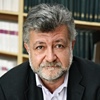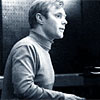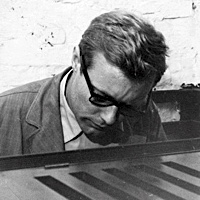Home » Jazz Musicians » Krzysztof Komeda
Krzysztof Komeda
Christopher Komeda's big time began back at the time of the I Sopot Jazz Festival in August 1956, but his ties with music were much older. Born in Poznan in 1931 he took piano lessons since his childhood and his first dreams were to be a famous virtuoso. They were no daydreams for at the age of eight he started at the Poznan conservatory. But the war upset his plans. During the war and later, until 1950 he continued to study the piano and theory but he was aware the six years were actually lost. Having graduated from secondary school he had to make up his mind as to his further studies. He wanted to have an exciting job and so he became an M. D. He got interested in entertainment and dance music before starting his studies. He went to secondary school at Ostrow Wielkopolski and there he met Witold Kujawski, a graduate of the same school who was already a well known swinging bass-player. It was Kujawski who initiated Komeda-Trzcinski into jazz. He took him to Cracow. It was the romantic period of Polish jazz, called the catacomb period. There were no concert jazz audiences then. In Witold's legendary little room in Cracow, jam-sessions were held with the participation of such renowned musicians as Matuszkiewicz, Borowiec, Walasek and the host himself.
A couple of years later it became clear why Komeda was the most impressed by the be-bop performance of a very young musician Andrzej Trzaskowski. His fascination with jazz and the friendship with leading musicians strengthened Christopher Komeda's connections with music in spite of his medical job. For some time he co-operated with the Polish post-war jazz pioneer combo, the Cracow-Lodz Melomani where Matuszkiewicz, Trzaskowski and Kujawski were the pillars. Later he played with various Poznan entertainment bands. One of them was Jerzy Grzewinski's group which soon changed into a dixieland band. Komeda appeared together with Grzewinski at the I Sopot Festival. But he was a great success at the festival not with him but with Ptaszyn Wroblewski and Milian. The reason was a simple one - dixieland wasn't enough for him any more. Modern music fascinated him above all. And from this passion the Komeda Sextet came into being. He first used his pseudonym "Komeda" when he was working at an Ear, Nose and Throat clinic, to hide his music passion from his colleagues. Jazz only just started fighting for its rights in Poland. It was still regarded as a cheap, suspect, night-club music. Komeda Sextet became the first Polish jazz group playing exclusively modern music and its spectacular performance on the festival stage cleared the triumphant way for jazz in Poland. Together with baritone saxophonist Jan 'Ptaszyn' Wroblewski and Jerzy Milian on vibes the sextet played cool jazz which referred to European jazz traditions and was a synthesis of the two most popular combos of that time: The Modern Jazz Quartet and the Gerry Mulligan Quartet.
Read moreTags
Komeda: A Private Life In Jazz

by Ian Patterson
Komeda: A Private Life In Jazz Magdalena Grzebałkowska 456 Pages ISBN: 978 1 78179 945 1 Equinox Publishing2020 That it has taken over fifty years for the first English-language biography of Krzysztof Komeda to appear reflects the pianist/composer's underground status outside his native Poland. Yet no history of European jazz would be complete without mention of this modernizing figure, whose career burned briefly but brightly from 1956, when he launched his modern jazz ...
Continue ReadingI nuovi percorsi del Polish Jazz

by Angelo Leonardi
Una nuova generazione si fa avanti con determinazione sulla scena del Jazz polacco e molti trovano accoglienza nel catalogo della For-Tune. L'etichetta si propone ambiziosamente di “salvare dall'oblio i fenomeni musicali di natura eterna." Non si rivolge esclusivamente al jazz o agli artisti polacchi e il suo catalogo ospita anche lavori di William Parker, Mary Halvorson, Anthony Braxton, Charles Gayle e più recentemente Bobby Previte (Gone , 2016) e Samuel Blaser con Michael Blake (Made in China--Trasmissions , 2016).
Continue ReadingIl Jazz-Film

by Angelo Leonardi
Il Jazz-Film Guido Michelone 349 Pages ISBN: 978-8862318747 Arcana Jazz 2016 Dopo quasi vent'anni, Guido Michelone ripubblica e amplia il suo fondamentale manuale sui rapporti tra cinema e musica afro-americana, l'unico in lingua italiana di tale spessore e completezza. Lo studio analizza quelle opere in cui le tematiche musicali sono parte attiva della dimensione iconica, tralasciando quasi del tutto il jazz usato come colonna sonora in film di tutt'altro argomento. Il ...
Continue ReadingMaciej Lewenstein: Quantum Mechanics of Polish Jazz

by Cezary L. Lerski
Maciej Lewenstein was born in 1955 in Warsaw. He is a theoretical physicist and currently an ICREA professor at Institut de Ciències Fotòniques (ICFO) in Castelldefels near Barcelona, Spain. He has written more than 500 scientific papers and is the recipient of many international and national prizes. Next to theoretical physics his other passion is music and jazz in particular. First edition of his new English-language book Polish Jazz Recordings and Beyond, was published in 2014 by ...
Continue ReadingKrzysztof Komeda: Poet of the Piano

by Jakob Baekgaard
To this day, the influence of Polish composer and pianist Krzysztof Komeda (1931-1969) can be felt in the works of contemporary artists like Marcin Wasilewski and, of course, in the music of his former trumpeter, Tomasz Stanko. It isn't too much to say that Komeda transformed the landscape of European jazz by the way he re-conceptualised the idea of jazz-composition and worked inventively with the relation between music and image, but he did it in his own quiet way and ...
Continue ReadingNew "Jazz In Polish Cinema" Box Set Release, Featuring Previously Unissued Krzysztof Komeda

Source:
Selwyn Harris
Jazz on Film Records announces the release on November 17th of a definitive 4-CD box set titled Jazz in Polish Cinema (Out of the Underground 1958-67) with rare and previously unreleased original soundtracks following its highly acclaimed French New Wave Volume, that reached # 5 in Mojo Magazine’s best soundtrack CDs of 2013. The box set is a treasure-trove of rare and previously unissued classic jazz film soundtracks written by a pair of legendary Polish composers-pianists Krzysztof Komeda and Andrzej ...
read more
Komeda Project Returns with Scott Colley and Nasheet Waits For Requiem, a Contemporary Tribute to the Music of Renowned Polish Composer/Pianist Krzysztof Komeda 40 Years After His Death

Source:
Braithwaite & Katz Communications
"…this is a jazz album, and what matters is how these musicians make Komeda's music their own. Russ Johnson's trumpet work is creative and diverse. Krzysztof Medyna is a powerful, hair-raising reed player. Pianist Andrzej Winnicki plays solos made of sudden shifts that all cohere…" — Thomas Conrad, Stereophile (review of group’s debut Crazy Girl)
“Andrzej's arrangements…are sophisticated and engaging, bringing to mind the warm vibe of such classic recordings as Kind of Blue…" — Michael Gallant, Keyboard
Plenty has ...
read more
"Crazy Girl" by Komeda Project - A Fresh New Look at the Wondrous Music of Krzysztof Komeda.

Source:
All About Jazz
KOMEDA PROJECT, a jazz quintet, was brought to life from a desire to perform - on this side of the Atlantic - and be able to hear live, music of Krzysztof Komeda again. Their just released Crazy Girl CD consists of six Komeda compositions ("Crazy Girl," “Kattorna," “Ballada," “Svantetic Prelude," “Svantetic" and “Sleep Safe and Warm") plus three of the group's originals and has already begun to be noticed here and abroad.
Download FREE MP3 Track from Crazy Girl
Calling ...
read more


















